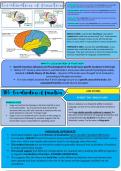Siffre - Study guides, Revision notes & Summaries
Looking for the best study guides, study notes and summaries about Siffre? On this page you'll find 14 study documents about Siffre.
All 14 results
Sort by

-
A Level Psychology Paper 2 Key Studies
- Exam (elaborations) • 2 pages • 2023
- Available in package deal
-
- £6.52
- + learn more
A Level Psychology Paper 2 Key Studies Darwin Explains evolution and the role of natural selection Broca Discovered the part of the brain responsible for the production of speech Wernicke Discovered the part of the brain responsible for the understanding of speech Sperry Tested hemispheric lateralization by presenting stimuli to only one hemisphere of split brain patients Turk Found a split-brain patient who was able to learn to produce speech from his right hemisphere Maguire Found that experi...
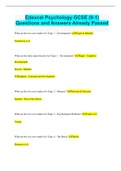
-
Edexcel Psychology GCSE (9-1) Questions and Answers Already Passed
- Exam (elaborations) • 4 pages • 2023
- Available in package deal
-
- £7.34
- + learn more
Edexcel Psychology GCSE (9-1) Questions and Answers Already Passed What are the two core studies for Topic 1 - Development? Piaget & Inhelder Gunderson et al What are the three main theories for Topic 1 - Development? Piaget - Cognitive Development Dweck - Mindset Willingham - Learning and Development What are the two core studies for Topic 2 - Memory? Peterson & Peterson Bartlett - War of the Ghosts What are the two core studies for Topic 3 - Psychological Problems? Caspi et al. Young What ...
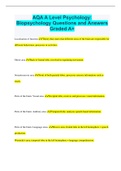
-
AQA A Level Psychology: Biopsychology Questions and Answers Graded A+
- Exam (elaborations) • 15 pages • 2023
- Available in package deal
-
- £8.15
- + learn more
AQA A Level Psychology: Biopsychology Questions and Answers Graded A+ Localisation of function Theory that states that different areas of the brain are responsible for different behaviours, processes or activities. Motor area Back of frontal lobe, involved in regulating movement. Somatosensory area Front of both parietal lobes, processes sensory information such as touch. Parts of the brain: Visual area. Occipital lobe, receives and processes visual information. Parts of the brain: Auditory ...
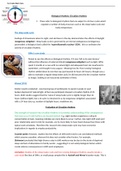
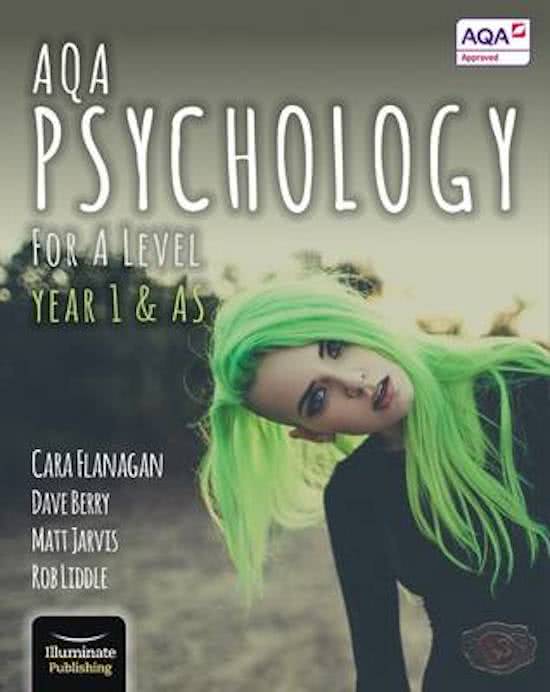
-
AQA Psychology: Circadian rhythms
- Summary • 2 pages • 2022
-
- £4.19
- + learn more
This document provides detailed A01 notes and A03 evaluation into circadian rhythms and works of Siffre for the biopsychology module, these notes are clear, and easy to follow. The A03 contains a deep explanation of both strengths and limitations to the theory/study, along with evidential support or criticism. Hi! I'm Ben, a former A level psychology student, now studying Psychology and Psychotherapy at University. Through using these notes, I was able to achieve Grade A in the final exams...
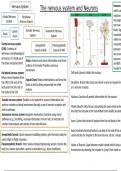
-
Summary Sheets (COMPLETED) for 'BIOPSYCHOLOGY': Psychology A-level
- Summary • 10 pages • 2024
- Available in package deal
-
- £7.16
- + learn more
This document provides a digital summary sheet (created on powerpoint) for every module within the 'Biopsychology' topic of Psychology A level. Each summary sheet provides in varying detail an outline (AO1) and 3-4 evaluation points (AO3) of the topic. Every slide has the required information to complete a top band 6 0r 16 marker (as some of these topics don't require evaluation) on the topics below. This pack includes: The Nervous system (CNS, PNS, Neuron types, synaptic transm...
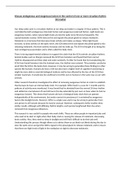
-
Discuss the role of endogenous and exogenous factors in the control of one or more circadian rhythms (16 marks)
- Essay • 1 pages • 2022
-
- £8.49
- + learn more
This essay includes evaluating studies by researchers such as Siffre and Morgan and is worth 16 marks. It discusses the biology behind circadian rhythms (e.g. the process of the pineal gland secreting melatonin) and is useful for any psychology student.
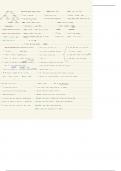
-
Biopsychology Notes
- Summary • 10 pages • 2023
-
- £4.19
- + learn more
In this document, there is a thorough summary of Biopsychology for the A-level AQA Psychology course. It involves strong relevant AO1 information to provide a deep understanding of the course. Alongside textbook help I have also researched the course myself and added any further information to deepen my understanding. My research involves Micheal Siffre, Phineas Gage and the important processes that take place in our body such as Synaptic transmission, the fight or flight response and the biolog...
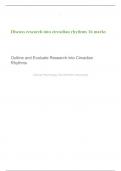
-
Outline and Evaluate Research into Circadian Rhythms
- Exam (elaborations) • 3 pages • 2024
-
- £8.56
- + learn more
Outline and Evaluate Research into Circadian Rhythms A circadian rhythm is a biological rhythm that occurs over a 24-hour cycle. For example, the sleep/wake cycle; we are at out most alert at 10am, we have the best coordination at 2:30pm, out fastest reaction time is at 3:30pm, and our deepest sleep is at 2am. Our circadian rhythms occur due to light and melatonin. Light sensitive cells in our eyes send messages about the levels of light, in our environment to the suprachiasmatic nucleus. T...
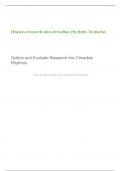
-
Outline and Evaluate Research into Circadian Rhythms
- Exam (elaborations) • 3 pages • 2024
-
- £6.52
- + learn more
Outline and Evaluate Research into Circadian Rhythms A circadian rhythm is a biological rhythm that occurs over a 24-hour cycle. For example, the sleep/wake cycle; we are at out most alert at 10am, we have the best coordination at 2:30pm, out fastest reaction time is at 3:30pm, and our deepest sleep is at 2am. Our circadian rhythms occur due to light and melatonin. Light sensitive cells in our eyes send messages about the levels of light, in our environment to the suprachiasmatic nucleus. T...
Revision notes from A/A* student

How did he do that? By selling his revision notes on Stuvia. Try it yourself! Discover all about earning on Stuvia



